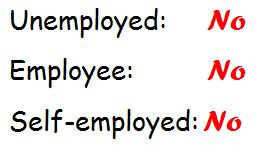The Economist calls you a post-materialist: you don’t feel driven by materialist ambitions. You just need enough to maintain your existing lifestyle, rather than improve it. But what does ‘not being your own boss’ mean in this context?
Firstly, who are today’s nontrepreneurs?
- a contented homeless person who occasionally gets paid in food for picking up litter?
- a housebound retiree who occasionally supplements their pension by selling their old bric-a-brac on eBay?
- someone who pays for occasional expensive restaurant meals by being prepared to wash the dishes?
- someone who is allowed to sleep in a room overnight in return for doing some household chores?
- a journalist, analyst or consultant paid for the occasional short job, which keeps them in a comfortable lifestyle with the occasional deadline, but no regular commute, no staff, no 9 to 5 existence, no investors, board meetings or business plan
None of these activities necessarily constitute either ‘employment’ or ‘a business’ in a sense that the tax authorities would feel strongly compelled to pursue anything but personal taxation and in many cases even that would not be applicable.
Post-materialism seems to sit at a mid-point on a spectrum bounded at one end by negatively regarded or stigmatised conditions, such as poverty, motivational problems, self-delusion or bad luck and at the other end by positive characterisations of a lifestyle being relatively stress-free, easy-going, relaxed and comfortable, in the face of opportunities for ‘self-advancement’ which are not pursued: those for whom the costs of participating in the rat-race outweigh the benefits.
Does nontrepreneurialism ultimately represent a genuine departure from the American dream (assuming those concerned are geographically relevant to it)? Does it represent something as extreme as a ‘rejection of the system’?
Does it actually not represent a new (or important) phenomenon, because it merely describes a marginal contingent in society, the inevitably anomalous but ultimately inconsequential few among the many?
Perhaps it mostly does not represent anything more than something ephemeral, a state which many go through ‘between jobs’ or between business opportunities as is the case when actors claim to be ‘resting’ between securing new parts.
Not pursuing opportunities, or not being presented with them, is not necessarily the same as explicitly and unreservedly rejecting very tempting or highly lucrative offers.
‘Not being your own boss whilst still doing enough work to sustain a relatively comfortable lifestyle’ leaves most of the words in that phrasing in serious need of further clarification.
On the subject of ‘not being your own boss’ and yet still not being employed, or ‘officially unemployed’ and not a ‘a business proprietor’, the following consequences seem to follow:
You are probably employed and running a business at some point, if you are earning money: your employer is telling you what they want you to do in order for you to get paid, or you are providing them with something they want: they are either your boss, your customer, or both: the transaction is either like employment or like having a customer or an employer, the ‘one-off-ness’ of it is what might make it feel like you don’t have a boss and simultaneously that you aren’t your own boss.
The ‘gaps’ when you aren’t earning (and when you are not necessarily desperate) may perhaps make you feel (or allow or encourage you to describe yourself) as being neither ‘employed’ nor ‘unemployed’. But I’m not sure ‘employment gaps’ make most of those of us who find themselves to be ‘intermittently employed’ feel inclined to think of ourselves as ‘nontrepreneurs’ (whether or not we coin that term or any other in this context).
Lastly, the ‘regular turning down of lucrative opportunities’: does such behaviour really characterise a newly emergent contingent? It just might, which is why I’m raising the next set of issues.
A question that seems to be worth asking, is whether there is actually a new phenomenon worth naming here. If the numbers (of people who have the kinds experiences/lifestyles of identified above) increase, those of us interested in startups might ask this further question:
Is nontrepreneurialism likely to impact the number of startups?
This in turn prompts the following:
- are nontrepreneurs merely ‘startups in denial’?
- is a nontrepreneur really a ‘lifestyle business’ in denial?
- is the nontrepreneurial option really just a precursor to becoming a startup (‘you haven’t encountered your startup epiphany yet’)
- is nontrepreneurialism ‘the last resting place for startup ambition’
- is nontrepreneurialism ‘a baseline condition for startup founders in between projects’
- does some kind of opportunity exist in targeting ‘uncommitted nontrepreneurs’ to become startup founders (or startup mentors)


